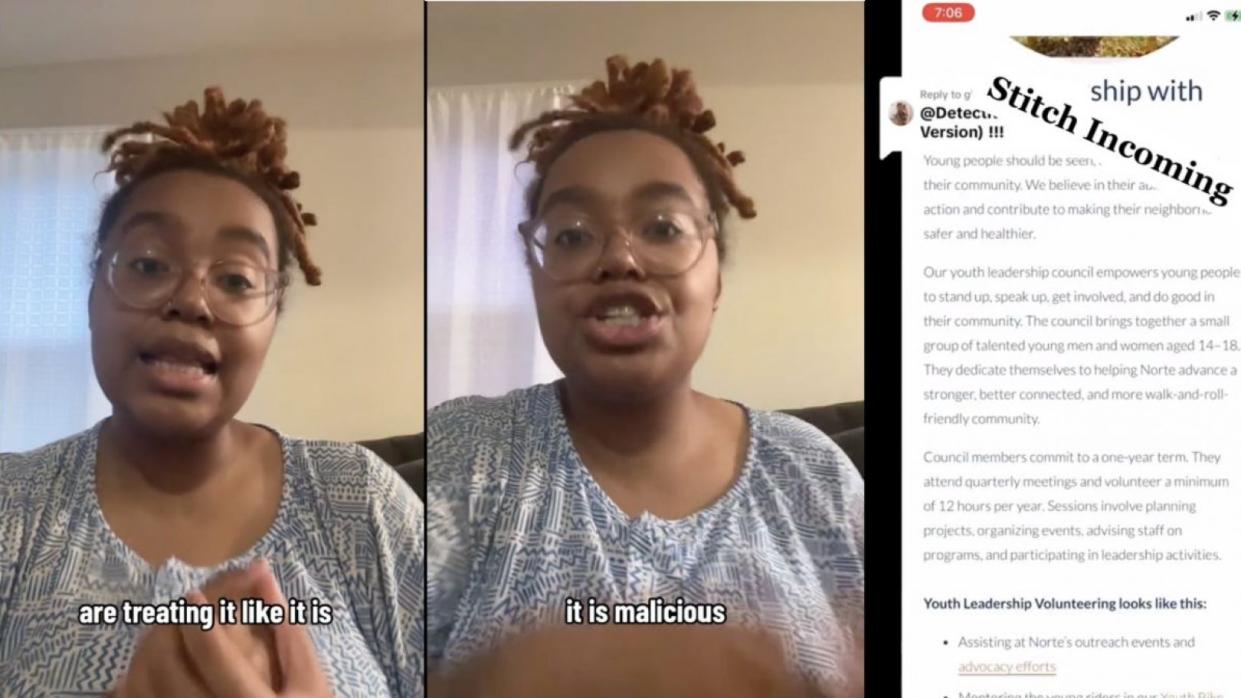TikTokers push back against users employing ‘digital harassment’ to find online crush

TikTokers are calling out an account that’s been accused of stalking people online and revealing their identities without permission.
Nia Óia (@shakingsheets) stitched a video from a TikToker — who goes by the handle @detectivespoopy — who consistently reveals people’s identities in videos despite those people not being tagged in the posts. During those videos, @dectectivespoopy takes five screenshots of the person’s face, runs it through facial recognition software and proceeds to find their social media handles.
Many people on TikTok have enjoyed these videos, with several garnering over 1 million views. However, Óia, who describes herself as a “disabled sexplorer & writer” in her bio, was not a fan.
@shakingsheets #stitch with @Detective (Taylor’s Version) Y’all concern me fr. #fypシ #womanism #feminism #surveillance
♬ original sound – Nia Òla 💗
“This is not OK” she said. “This is stalking and digital harassment.”
She then showed and described an example of another TikToker who allegedly searched LinkedIn to find out where a potential love interest worked and even reached out to their parents in order to get close to them.
Many commenters shared Óia’s surprise that people would go to those lengths.
“Did everyone think ‘You’ was a handbook on romance?!” replied @thisgloria, referring to the hit Netflix show.
This type of behavior isn’t uncommon — or even fully frowned upon by some relationship experts as long as clear boundaries are set and respected.
“It’s normal to scope someone’s profile,” marriage and family therapist Alicia Ortega told In The Know by Yahoo. “Healthy relating needs respect and space, even online. If they’ve asked you to back off or seem uncomfortable, time to pump the brakes.”
Legally, Óia is correct, as the line between pursuing and harassment is drawn by the idea of consent and mutual interest.
“An online pursuit, characterized by respectful dialogues, admiration of public content, and mutual engagement, falls within accepted digital social norms,” family lawyer Laura Wasser told In The Know. “However, when such interactions become non-consensual, relentless, and invasive, causing unease or alarm, it evolves into online stalking and harassment.”
Even if this behavior is considered stalking, it’s something that younger generations have become accustomed to. According to a survey conducted by The Harris Poll, 34% of Gen Zers and 35% of millennials don’t mind being stalked online, as long as it doesn’t turn into stalking in real life. That’s compared to only 10% of people over the age of 58.
While some of @detectivespoopy’s viewers say that what the account is doing is scary, there are others who enjoy it — and ask for help finding people in their lives.
While many Gen Zers aren’t as concerned with online stalking as other generations, experts reiterate the need for respect and consent no matter what generation you call your own.
In The Know by Yahoo is now available on Apple News — follow us here!
The post TikTokers push back against users employing ‘digital harassment’ to find online crush appeared first on In The Know.
More from In The Know:
I'm a lifestyle editor, and here are 15 goodies I'm eyeing from the Nordstrom Anniversary sale
All I want to do is dress like Barbie this summer, and here are 12 pink styles I'm shopping

 Yahoo Movies
Yahoo Movies 
